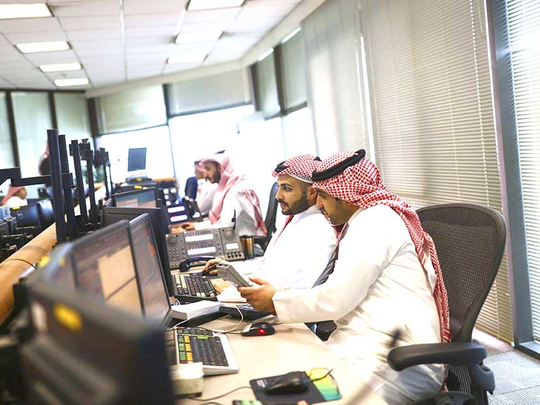
Dubai: The Saudi equity market is set for a boost as it heads for possible inclusion in MSCI’s influential emerging market index in 2018.
“In the meantime, active Emirati investors could reap early gains as corporate earnings should start increasing this year,” said Shakeel Sarwar, Head of Asset Management at SICO BSC.
“The market has moved sideways in the first half of 2017 after the spectacular 30 per cent rally late last year. However, the latter part of the second half could again be an interesting period for the market. The key catalysts for another rally are going to be FTSE- and MSCI-related developments.”
With FTSE set to announce its country classification review in September, market participants estimate that it can result in regular inflows from September onwards. MSCI upgrade is expected next year but positive news flow on this front will keep coming and sustain the interest of active fund managers in the market, Sarwar added.
Large caps that are expected to be the biggest beneficiaries of such flows are trading at attractive multiples and should do well in general versus the overall market going forward.
“Corporate earnings should start recovering during the second half of the year, supported by better oil prices and ongoing economic reforms,” he added.
SICO expects many stocks to benefit from cyclical trends and further structural reform efforts including broad recovery in earnings after two to three years of decline, dividend increases as corporate cash flows improve, further easing of foreign investor rules by the Capital Market Authority and initial public offering in Saudi Aramco, the world’s largest oil producer.
SICO Kingdom Equity Fund invests exclusively in Saudi equities. Against the Tadawul return of 3 per cent during the first six months of 2017, the fund has returned 7.6 per cent during the same period including a cash dividend of 5 per cent. The fund has posted returns of more than 55 per cent in the past five years compared to a modest 10 per cent return for Tadawul during this period.
“This is due to a focus by SICO to invest in companies that are expected to benefit from economic reforms, rising interest rates and changing regulatory landscape.
With consumption relatively subdued, we are looking at well-managed companies that will benefit directly from a more diverse, more open economy as the Kingdom moves away from its reliance on petroleum,” said Sarwar.
“Falling oil prices were tough on the domestic economy over the last three years. Astute firms have cut costs and gained market share. There are also selective opportunities in the survivors — the best-run telco and consumer stocks. A round of banking mergers should benefit Emirati investors, too.”
On the macro front, as a result of increase in oil prices and structural reforms undertaken by the government, the macroeconomic numbers for 2017 are already looking much better than those of 2016. Further improvement in the next couple of years as the pace of economic reforms increases.
“The listing of Aramco and implementation of VAT and other taxation and subsidy removal measures will be some of the key milestones which the market will be following very closely over the next couple of years. These reforms and measures will not only improve the financial flexibility of the government but would also ensure that going forward like in the developed world, capital markets are used more efficiently in the efficient allocation of capital. Growth and development of capital markets will remain one of the key priorities of the government,” Sarwar said.












